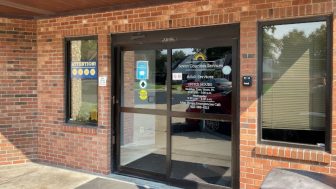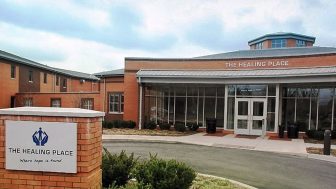Praxis of Louisville by Landmark Recovery
4418 Malcolm Ave
Louisville, KY 40215
About Praxis of Louisville by Landmark Recovery
Golden Grove Recovery by Alsos Behavioral Health is an addiction treatment center in Louisville, Kentucky offering medically supervised detox, inpatient care and medication assisted treatment (MAT) for adults.
It serves individuals with co-occurring mental health conditions including veterans, military personnel and LGBTQ+ clients using mission driven, evidence based and holistic approaches.
Addiction Treatment Programs at Praxis of Louisville
I appreciate that most clients here begin with medical detoxification to safely manage withdrawal symptoms followed by structured inpatient treatment for 24-hour care.
Therapy services at Praxis of Louisville include individual and group therapy, dual diagnosis treatment for mental health concerns, relapse prevention and family counseling. The program also incorporates holistic approaches like meditation and yoga as well as 12-Step and SMART Recovery support to enhance long-term recovery.
Payment and Insurance
I found that this facility accepts Medicaid and most major insurance plans (Aetna, Cigna, Humana, BCBS, Tricare, VA) with deferred payment plans and financial counseling.
How to Begin Treatment Here
If you are in Louisville, Kentucky and considering Golden Grove Recovery then the process starts with an initial assessment by their intake team. They'll verify your needs, discuss co-occurring conditions and assess which program is most appropriate. They’ll also help you understand insurance and payment options to make treatment accessible.
Amenities
Yoga and meditation are great activities to support your recovery process during alcohol or drug rehab. These therapies have been around for centuries, and they are an effective way to improve well-being. Combining addiction treatment, yoga, and meditation can reduce cravings, improve sleep, relieve anxiety and depression, provide stress relief, promote relaxation, support emotional healing, and improve energy levels.
Treatment centers with a yoga studio offer a special form of holistic therapy during the recovery process. Yoga boosts mindfulness, a sense of calm, and healthy reflection during drug rehab via breathing exercises, stretching, and a progression of specific postures.
Addiction treatment programs provide an opportunity to get your life back on track with access to school classes or college courses. Whether you want to finish your GED or go back to school to learn a new trade, facilities often enlist tutors and teachers who are certified or licensed by the state to oversee self-study or distance-learning education.
When paired with cognitive-behavioral therapy, exercise can be an effective tool for overcoming addiction. Drug rehabs with a gym offer clients healthy ways to increase energy levels, balance the body’s stress hormone levels, and aid in the brain’s healing process.
Addiction Treatment Programs
Adolescents and young adults who are struggling with addiction can get help at a young adult program in Kentucky. These programs offer specialized drug abuse treatment for individuals in their teens and 20s.
Recovery from addiction happens at an adult program in Kentucky. These treatment services provide the support needed to help men and women break the cycle of addiction and live a life free from substance dependence.
Alcohol rehab in Kentucky helps participants develop motivation to change, learn new coping skills, and achieve long-term sobriety. Treatment methods typically include individual and group therapy and 12-step support.
Men’s rehab in Kentucky often addresses both substance use disorders and co-occurring disorders. Men can seek treatment for drug or alcohol addiction as well as gender-specific treatment for depression, anxiety, bipolar disorder, PTSD, and ADHD.
Women’s rehab in Kentucky provides the opportunity for women to get support from their female peers. These connections can help women overcome challenges and achieve long-term recovery.
Opioid rehab in Kentucky teaches individuals strategies to overcome addiction. Through the use of multiple treatment modalities, such as behavioral, experiential, and medication addicted treatment, these programs help men and women achieve long-term sobriety.
Drug rehab in Kentucky often starts with detox, then includes inpatient or outpatient treatment, and continues with aftercare support. Specific methods used during each of these phases varies, but often include individual and group counseling, medication, and recreational therapies.
Women’s rehab in Kentucky provides the opportunity for women to get support from their female peers. These connections can help women overcome challenges and achieve long-term recovery.
Veteran’s rehab in Kentucky focuses on helping Veterans make lifestyle changes and positive decisions to overcome addiction. Treatment often includes cognitive behavioral therapy, eye movement desensitization and reprocessing (EMDR), pain management, and group therapy.
Levels of Care
Kentucky outpatient rehab experts will assess your needs and create a treatment program tailored to your recovery. Treatment typically includes several hours of counseling each week as well as group therapy. You’ll probably also attend a support group such as NA or AA. Length of treatment varies based on your needs.
Kentucky dual diagnosis treatment centers focus on treating mental health disorders alongside addiction. Common methods include counseling, medication management, relapse prevention, and cognitive-behavior therapy.
Ongoing recovery requires ongoing treatment in the form of Kentucky aftercare rehab Once you complete an initial treatment program, aftercare provides long-term support to keep you on the recovery path. 12-step groups, occasional counseling, and personal life coaching may continue for several months or a year.
Inpatient rehab, also known as residential rehab, means living at the drug rehab in Kentucky while receiving 24/7 supervised medical care. Treatments typically include individual and group therapy, as well as medication and various forms of psychotherapy.
The process of cleansing your body of addictive substances is called detox. This is usually the first step of drug rehab in Kentucky. You’ll receive round-the-clock care during this time, including medication to alleviate withdrawal symptoms.
Residents of Kentucky sober living homes receive peer support as they work toward independent living. This communal situation typically includes involvement in a 12-step program, participation in household responsibilities, and strict house rules. An average stay is five to eight months, but you can decide when you’re ready to move out on your own.
The goal of intervention services in Kentucky is to motivate your loved one to begin their journey toward recovery. These services can help you plan and facilitate an intervention, develop a treatment plan, and choose the best type of program for your loved one.
Partial hospitalization programs (PHPs) allow you to live at home while receiving onsite treatment at drug rehab facilities in Kentucky. You may receive many of the same treatment modalities of inpatient care, with the difference being that you can return home during non-treatment hours.


